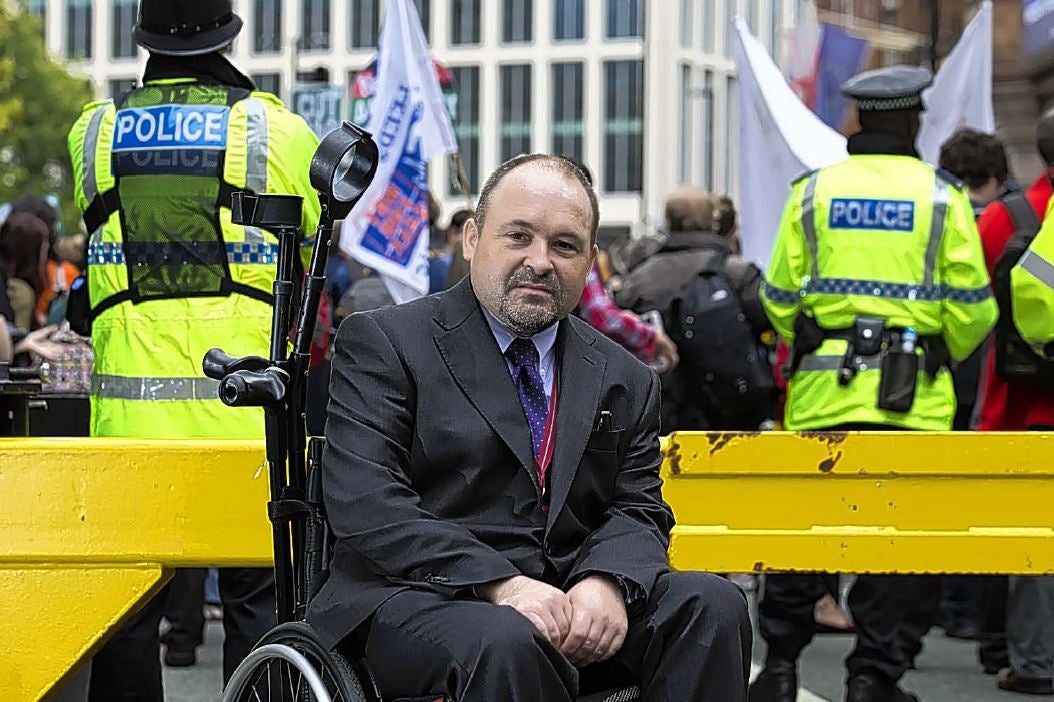I believed that speaking to people like me would change the way the Tories thought about disability. I was wrong
While I still don’t think I deserved their opprobrium, the protesters who spat and shouted at me for attending the Conservative Party conference might actually have achieved more than I did


Having people scream and spit at you is a truly vile thing to experience. Understanding, even sympathy, for those responsible is not a natural reaction. Fear, anger, even fury, are closer to what you might expect.
Yet I find myself coming around to the stance of the people who did it to me, and no this is not a delayed attack of Stockholm Syndrome.
Let me explain: about 18 months ago I was invited up to the Tory Party conference by a disability charity that wanted me to chair a fringe meeting.
I was at first reluctant. I still have quite a bit of psychological baggage from having had a cement truck on top of me.
But the charity was willing to supply a baby sitter to accompany me and deal with any issues relating to the journey, and the hotel, and sundry arrangements, so, after some soul searching, I agreed to give it a go.
What I didn’t envisage was having to brave a mob of angry demonstrators before getting down to the job I’d been asked to do. The protestors’ anger had been sparked by the Government’s cuts to disability benefits (among other things) and when they spotted me, they quickly zeroed in on me because I was, you know, using a wheelchair, and so letting the side down.
After the nasty panic attack this prompted had faded, I wrote about my experience for The Independent, making the point that most of us running the gauntlet weren’t party members, many weren’t even Tory voters (myself included). We were simply trying to do something to influence policy makers in the hope of making things a bit better.
Clearly that hasn’t worked very well. When it comes to people with disabilities, ministers have, if anything, tightened the screw. They did suffer a reverse last year over a raft of fresh cuts proposed by former Chancellor George Osborne. But that came as a result of intense public pressure combined with the threat of a backbench rebellion that was threatening the Government with a defeat in the House of Commons. The U-turn that followed wasn’t down to any quiet persuasion.
What has pushed me towards the demonstrators’ camp, however, is actually something that might appear to be rather innocuous: a tweet by Penny Mordaunt, the latest person through the revolving door of ministers charged with looking after disabled people. Or, rather, charged with finding ways to re-classify them as not disabled while making it look like the Government gives a hoot.
Ms Mordaunt has been making a big noise about improving accessibility in Britain. Her tweet hailed all those who have pledged to “invest, support, design and create our project to make the UK accessible to all”. Clap hands. Hooray!
The trouble is, while it’s nice to see her paying attention to what is indeed an important issue, the tweet appeared shortly after the Work & Pensions Committee had attacked her department’s appalling plans to cut Employment & Support Allowance, paid to those with conditions serious enough to limit their ability to work.
I wrote a piece about those plans before the appearance of that tweet, and, as often happens when I cover issues relating to disability, I heard from a lot of disabled people, some of whom are in the crosshairs of Ms Mordaunt’s Department for Work & Pensions.
When reading their stories, and communicating with them, I have been finding it increasingly hard to maintain the journalist’s necessary emotional detachment. I’ve had to take to pushing my wheelchair around the local area while listening to Public Enemy’s righteous anger at high volume to help me deal with the anger I’ve been feeling.
After a recent trip I remembered the demonstrators and their fury. I remembered that tweet, and what I believe to be the untruthfulness behind the minister portraying herself as battling for disabled people and… I got it. I saw where the demonstrators were coming from. I understood.
While I still don’t think I deserved their opprobrium – my intentions were good – they might actually have achieved more than I did. They got the issue of disability policy talked about, and that isn’t always easy to do.
The intemperate fury of those demonstrators may be needed again. You may have noticed that this week the Institute for Fiscal Studies issued a decidedly gloomy report about the position of the UK’s public finances. We are, it warned, potentially in for years more austerity.
Yet, even in the midst of a fiscal squeeze, the Government has options. The Coalition, followed by the current Conservative Government, chose to place the burden of austerity on the young, and on people with disabilities – on some of the most vulnerable people in society.
To justify disability benefit cutbacks, they have created a climate of suspicion and fear, while handing the job of assessing people to private, profit-driven companies that have demonstrated little apparent understanding of what they’re doing.
Civilised discussion in air-conditioned rooms has failed to have much impact on the Government’s direction of travel. And that’s why I now understand the shouting and the screaming and even the spitting.


Join our commenting forum
Join thought-provoking conversations, follow other Independent readers and see their replies